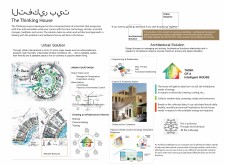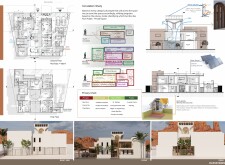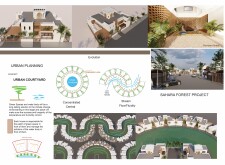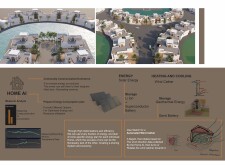5 key facts about this project
### Overview and Concept
The Thinking House is an architectural initiative designed for a desert environment, focusing on creating an adaptive habitat that responds to climatic, technological, and community needs. It seeks to address the unique challenges of arid regions, including extreme temperatures and social dynamics, by promoting sustainability and community interaction through a thoughtfully designed built environment.
### Urban Courtyards and Environmental Strategy
The project features urban courtyards that play a critical role in mediating the desert climate. These courtyards are characterized by extensive vegetation, which not only contributes to lower ambient temperatures and improved air quality but also fosters a calming atmosphere. Additionally, integrated water features facilitate evaporative cooling and enhance microclimate conditions, while passive environmental control mechanisms support natural ventilation, creating inviting outdoor spaces that encourage social interaction and community engagement.
### Architectural and Material Considerations
The layout of The Thinking House employs distinct zoning strategies to balance privacy and communal living. This organization of space promotes secure circulation while allowing for social connectivity among residents. The architecture integrates advanced sustainability features, including renewable energy systems and intelligent home technologies capable of optimizing energy use in real-time.
Material selection for the project prioritizes both functionality and ecological responsibility. Robust concrete provides structural integrity, while wood elements introduce warmth to interiors. Strategic placements of glass optimize natural light and thermal regulation, and durable metal is utilized in solar energy systems and supporting infrastructure. These materials collectively contribute to the project's energy efficiency and environmental sustainability objectives.























































